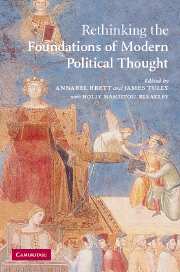Book contents
- Frontmatter
- Contents
- List of contributors
- Preface
- Part I Introduction
- Part II Rethinking the foundations
- 3 Foundations and moments
- 4 Skinner, pre-humanist rhetorical culture and Machiavelli
- 5 Unoriginal authors: how to do things with texts in the Renaissance
- 6 ‘The Best State of the Commonwealth’: Thomas More and Quentin Skinner
- 7 Scholasticism in Quentin Skinner's Foundations
- 8 Scholastic political thought and the modern concept of the state
- 9 ‘So meerly humane’: theories of resistance in early-modern Europe
- 10 Hobbes and democracy
- 11 A lion in the house: Hobbes and democracy
- 12 Hobbes and the foundations of modern international thought
- 13 Surveying The Foundations: a retrospect and reassessment
- Bibliography
- Index
8 - Scholastic political thought and the modern concept of the state
Published online by Cambridge University Press: 19 February 2010
- Frontmatter
- Contents
- List of contributors
- Preface
- Part I Introduction
- Part II Rethinking the foundations
- 3 Foundations and moments
- 4 Skinner, pre-humanist rhetorical culture and Machiavelli
- 5 Unoriginal authors: how to do things with texts in the Renaissance
- 6 ‘The Best State of the Commonwealth’: Thomas More and Quentin Skinner
- 7 Scholasticism in Quentin Skinner's Foundations
- 8 Scholastic political thought and the modern concept of the state
- 9 ‘So meerly humane’: theories of resistance in early-modern Europe
- 10 Hobbes and democracy
- 11 A lion in the house: Hobbes and democracy
- 12 Hobbes and the foundations of modern international thought
- 13 Surveying The Foundations: a retrospect and reassessment
- Bibliography
- Index
Summary
Quentin Skinner accorded scholastic authors a prominent role in putting in place ‘the foundations of modern political thought’. This much is plain if we consider the four essential preconditions for ‘the acquisition of the modern concept of the State’ that he listed in his conclusion. Skinner postulated, first, that ‘the sphere of politics should be envisaged as a distinct branch of moral philosophy, a branch concerned with the art of government’; secondly, that ‘the independence of each regnum or civitas from any external and superior power should be vindicated and assured’; that ‘the supreme authority within each independent regnum should be recognised as having no rivals within its own territories as a law-making power and an object of allegiance’; and finally that ‘political society is held to exist solely for political purposes’. According to the narrative offered over the course of the two volumes of Foundations, thirteenth-century scholastic doctors at the university of Paris, together with those members of religious orders and others who developed their work in the context of the northern Italian city-states, were critical in establishing the first precondition, by vindicating Aristotle's vision of politics against conservative forces within the church.
- Type
- Chapter
- Information
- Rethinking The Foundations of Modern Political Thought , pp. 130 - 148Publisher: Cambridge University PressPrint publication year: 2006
- 7
- Cited by

